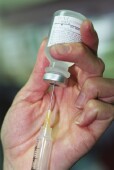
MONDAY, June 9, 2014 (HealthDay News) — Toddlers who get a newer vaccine that fights four infections in one jab have a slightly increased risk of fever-induced seizure, a large new study confirms.
At issue is a vaccine that targets measles, mumps, rubella and varicella (chickenpox) in one shot, instead of giving the traditional MMR and varicella vaccines separately.
In theory, one shot sounds better than two. But in the new study, 1-year-olds who received Priorix-Tetra — the MMRV vaccine used in Canada — were twice as likely to develop a fever-related seizure as children who got separate MMR and chickenpox shots.
The findings are in line with a 2010 study of the MMRV vaccine used in the United States, known as ProQuad.
In the United States, parents now have to explicitly ask for the MMRV if they want their toddler to have it, said Dr. Nicola Klein, who led the ProQuad study.
But even with the increased risk posed by the MMRV vaccine, the odds of a brief, fever-related seizure are extremely low.
And the seizures aren’t dangerous, “though they are scary for parents,” said Klein, co-director of the Kaiser Permanente Vaccine Study Center in Oakland, Calif.
She said children are actually much more likely to suffer a high fever and seizure if they were to catch the measles.
“Get your child vaccinated,” she stressed. “We’re in the middle of a 20-year high in measles cases.”
Fevers are part of the immune system response, whether to infection or vaccination.
It’s not clear why the MMRV is more likely to cause a fever-related seizure than the separate shots, said Shannon MacDonald, a post-doctoral fellow at the University of Calgary in Alberta, Canada, who led the new study. But one theory maintains the combined vaccine triggers a stronger immune response and a higher fever in some children, which makes a seizure more likely.
MacDonald’s findings, published online June 9 in CMAJ (Canadian Medical Association Journal), are based on records for almost 278,000 Alberta children between the ages of 12 and 23 months. The children received either the MMRV or separate MMR and chickenpox shots on the same day.
Overall, the study found, children’s seizure rate peaked seven to 10 days after they were vaccinated. At that point, there were almost six seizures for every 10,000 doses of the MMRV, versus two seizures for every 10,000 doses of the separate vaccines.
“You see the same increase in risk with these different formulations,” said MacDonald, referring to the Priorix-Tetra and ProQuad vaccines.
The traditional approach — separate MMR and chickenpox vaccines — seems safer.
“There’s no question children should be vaccinated,” MacDonald said.
As of May 30, the U.S. Centers for Disease Control and Prevention had received reports of 334 measles cases in 18 states. Nearly all have involved unvaccinated U.S. residents who traveled to countries where measles is common, then brought the virus home with them.
Besides causing misery — fever, cough, and a body-wide rash — measles infection can lead to serious complications. Up to 5 percent of infected children develop pneumonia, the CDC says, while one in 1,000 suffers brain inflammation. And for every 1,000 children who develop measles, one or two will die.
But parents should be aware that the MMRV carries a higher seizure risk and discuss that with their pediatrician, MacDonald said. Some parents may still want the combined shot, to spare their child from two needle jabs, she added.
Based on the ProQuad study, the U.S. Advisory Committee on Immunization Practices changed its stance on the MMRV. Now it says that unless parents ask about the combined vaccine, doctors should default to separate shots for young children getting their first dose of the MMR and chickenpox vaccines.
The story is different, though, with the second dose, typically given between the ages of 4 and 6 years. In general, fever-related seizure is uncommon at those ages, and the advisory committee says the MMRV is the better option.
More information
The U.S. Centers for Disease Control and Prevention has more on the MMRV vaccine.
Copyright © 2026 HealthDay. All rights reserved.

